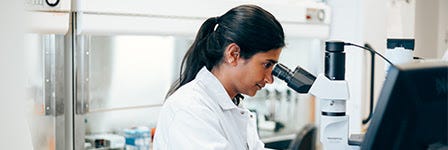Five Tips for Returning to the Lab After Time Off

Life circumstances may have caused you to take prolonged time off from your research career. Perhaps it’s a planned parental leave, a medical leave, or a sudden emergency that calls for time away from the lab bench.
Your transition back to work after a prolonged absence can be filled with both excitement and challenges. You may feel energized about getting back to your research and seeing your colleagues again. At the same time, you may feel anxious about all of the experiments that you will have to do upon your return.
Take the opportunity to pause, reflect, and embark upon a fresh start. Having a transition plan can help make this period a positive experience. Follow these five tips to ensure a smooth and effective transition back to work.
1. Use Your Fresh Perspective
Time away from work can result in fresh perspective when you return, and help you see your project and your practices differently. Allow yourself to be curious and critical about the work that you are doing. You could end up with new and creative ideas for your research.
Keep an open mind and re-evaluate your procedures and techniques. You may notice inefficiencies or other areas for improvements in the way you work. Perhaps it’s time to try something new to make your work more effective and efficient.
2. Keep Current
Staying current is crucial for your ability to contribute to the advancement of your field. Spend some time and energy to update yourself on the current state of your field before you jump back into your experiments. Catch up on recent key publications and science podcasts to get a sense of what other researchers have been up to.
Science News
Keep up with scientific discoveries in your research area. Receive curated publications weekly in your inbox.
The Stem Cell Podcast
Stay current on the latest in stem cell research by listening to conversations with experts in the field.
3. Get Organized
Scan through your electronic folders, latest files, and lab notebook. Reacquaint yourself with your file organization system, your protocols, and remember where you left off prior to your time away. If you find yourself feeling disorganized, follow our tips to get your files into order.
How to Organize Your Notebook and Files
Start fresh and follow these tips to keep your files organized.
Your inbox may seem daunting, but the key to not feeling overwhelmed is to prioritize and be selective about what you read and reply to. There are a few strategies to deal with email after a work absence. One efficient option is to filter out the junk, and then group and scan through communications from key contacts, such as your supervisor and collaborators. Rather than replying to every message, consider scheduling short meetings with these people to catch up and discuss how to move forward now that you are back in the lab.
You may also feel that your lab bench or storage spaces are disorganized, which can erode your productivity as you jump back into your experiments. Take the time to tidy up your lab and step towards greater efficiency.
Checklists and Templates
Download checklists and templates to help you get organized for your return to the lab after prolonged time off.
4. Adapt to Changes and Stay Positive
A lot may have changed in your lab while you were away. Perhaps there are new processes and technologies, new lab members, or major scientific advancements. Do your best to embrace and adapt to these changes. Have an informal meeting with a colleague in your lab to refresh your connection and ask them what you’ve missed. Ask your supervisor for an update on whether there has been progress on your research project while you were away.
Change can be uncomfortable, especially if it’s unexpected. Keep an open mind and try to stay positive throughout your return period. Remind yourself that returning to work in itself is a positive change.
5. Work Smarter, not Harder
After a prolonged time off, you may feel the need to work extra hard to make up for your time off. Refrain from trying to do too much and adding extra hours to your work day. This will only make your transition back to work more difficult, or worse, you may burn out. Manage your time and energy carefully by taking breaks and taking care of yourself. Instead of trying to work harder, find ways to work smarter so that you can accomplish more in less time and with less effort.
Nine Habits of a Highly Productive Researcher
Increase your work efficiency by following these tips.







